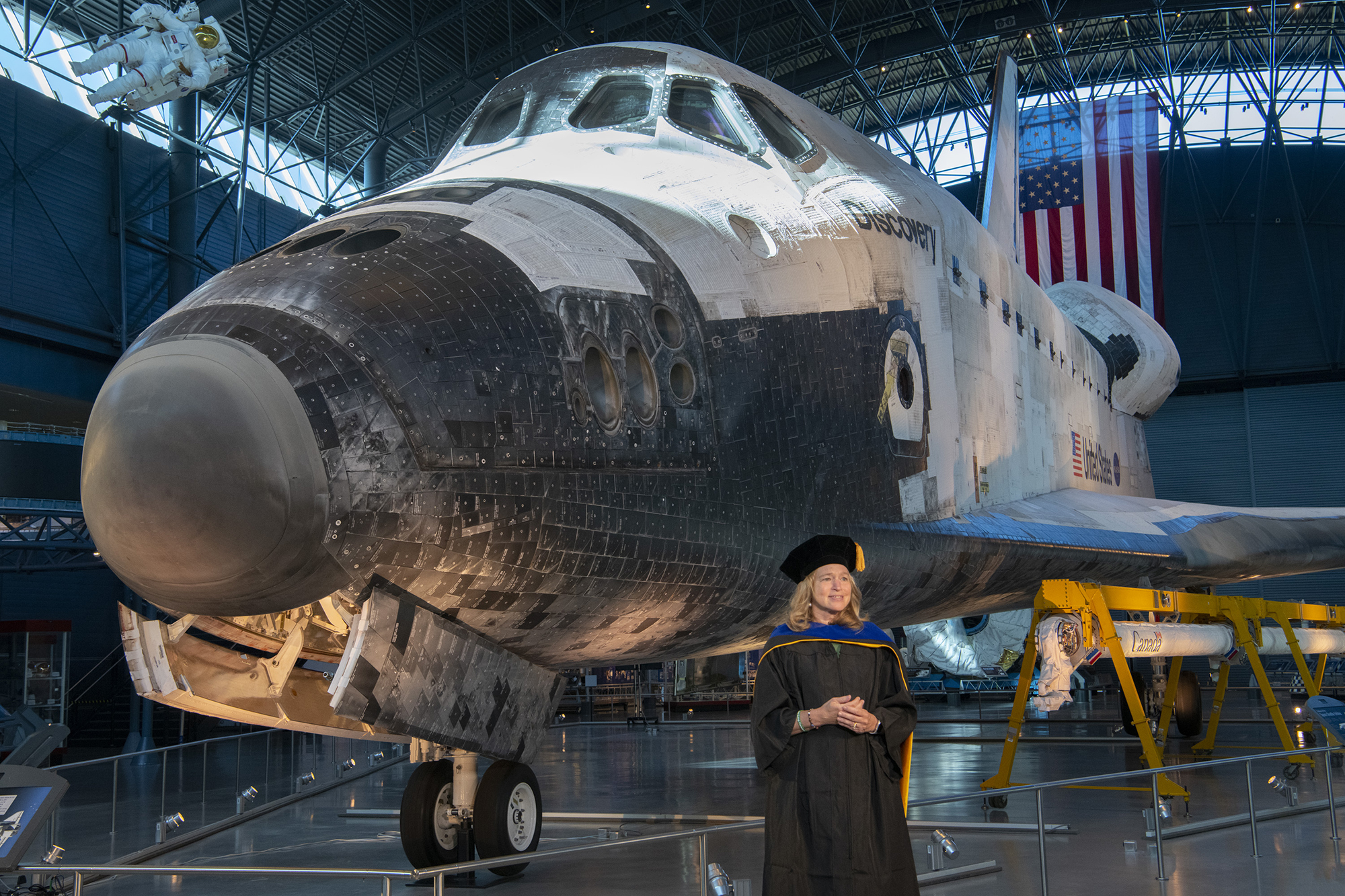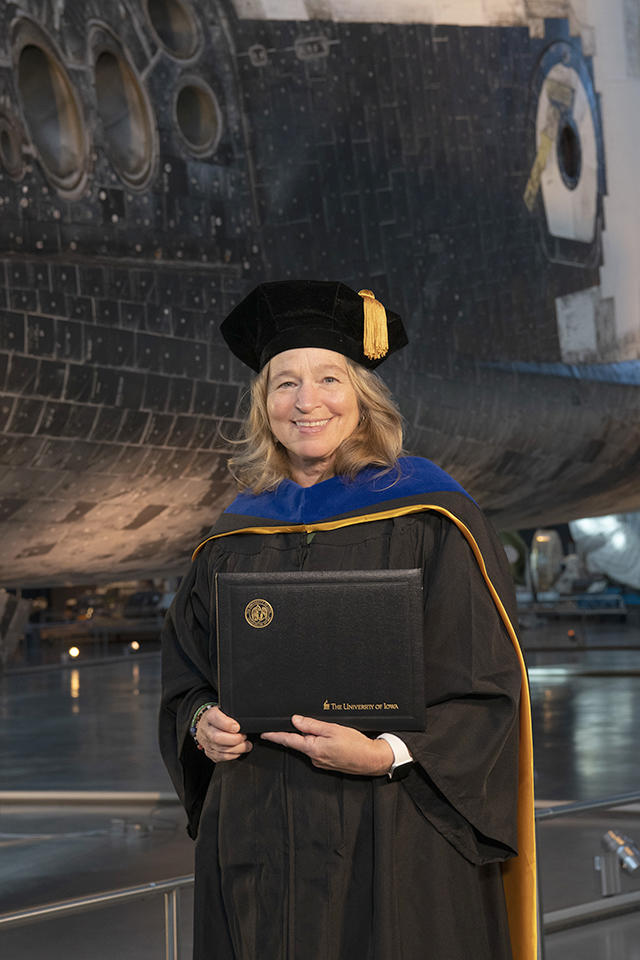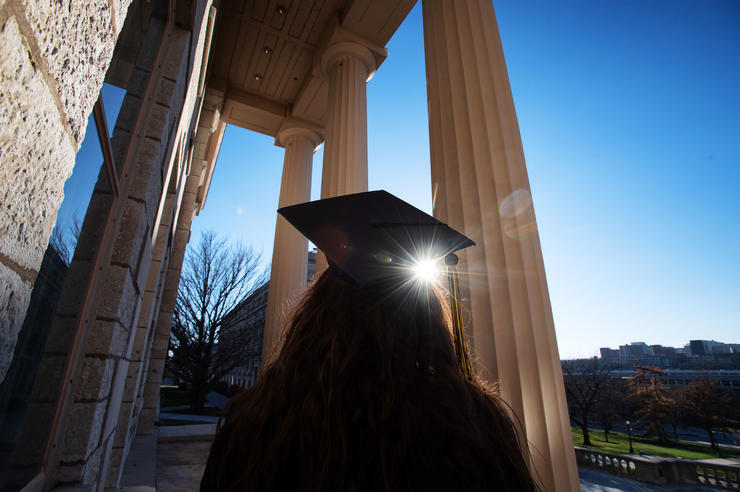Former NASA chief scientist to receive honorary degree

The director of the Smithsonian National Air and Space Museum and former NASA chief scientist Ellen Stofan will receive an honorary Doctor of Science degree from the University of Iowa during fall 2020 virtual commencement on Dec. 18.
Stofan, a native of Oberlin, Ohio, has more than 25 years of experience in space-related organizations and is the first female director of the Smithsonian National Air and Space Museum in its 76-year history; Stofan is in her third year as director. Stofan is a pioneer for women and minorities looking to pursue STEM fields: She earned her undergraduate degree in geology at the College of William & Mary in Williamsburg, Virginia, and her master’s and doctoral degrees at Brown University, both in geological sciences.
Stofan has worked closely with the UI Department of Physics and Astronomy as an associate member of the Cassini Mission to Saturn Radar Team and co-investigator on the Mars Express Mission’s MARSIS sounder, which searched for liquid water below the Martian surface. She has worked closely with UI students and in 2018 presented an on-campus lecture titled “Climate Change: Keeping the Earth Green, Clean, and Habitable,” in which she addressed why studying nearby planets is key to combating climate change on Earth.
“It’s thrilling to have a great institution like the University of Iowa look back over my career and deem it worthy of this wonderful recognition,” says Stofan. “I’m so thankful for the honorary degree, and the opportunity to speak with this amazing group of graduates.”

Dr. Ellen Stofan, the John and Adrienne Mars Director of the National Air and Space Museum, will receive an honorary Doctor of Science degree from the University of Iowa during fall 2020 commencement ceremonies. She is seen in front of the Space Shuttle Discovery, located in the James McDonnell Space Hangar at the Steven F Udvar-Hazy Center in Chantilly, Virginia.
On top of her honorary degree from Iowa, Stofan is also an honorary professor at University College London.
“I have always done the work I do because I love it, because it’s my passion, and because I find it inherently rewarding,” she says.
As NASA’s chief scientist from 2013 to 2016, Stofan looked at the bigger picture as the adviser to former NASA Administrator Charles Bolden. Among other projects, Stofan helped develop a long-range plan to get humans to Mars and transition away from the International Space Station. She has addressed the World Economic Forum’s Council on the Future of Space Technologies and continues to serve as a member of the council.
“I hope to see the first humans set foot on Mars, and when they do, I hope that my work with institutions like NASA and the National Air and Space Museum, and my outreach to young people like these Iowa graduates, has helped prepare and empower the Mars generation for humanity’s next great leap into the solar system,” says Stofan.
With a background in geology, Stofan’s research has included studying the geology of Venus, Earth, Mars, and Saturn’s moon Titan. Her research has culminated in many publications, including Exploring Venus as a Terrestrial Planet (2007), Planetology: Unlocking the Secrets of the Solar System (2008), and Next Earth: What Our World Can Teach Us About Other Planets (2008), the last two volumes having been published by National Geographic’s press, Nat Geo Books.
Venus remains a focal point for Stofan and her research as she feels it helps us understand more about Earth-like planets.
“The Magellan mission to Venus may be my favorite,” says Stofan. “It was a radar mission that mapped Venus as an entire Earth-sized planet the first time, peering through its cloud cover in ways we’d never done before. It discovered amazing things like volcanoes all over the surface and complicated faulted and ridged regions. Venus is such an important planet because it can help us understand the likelihood of other Earths being out there.”
Stofan was nominated by Joseph Kearney, former interim dean of the College of Liberal Arts and Sciences; Philip Kaaret, professor in the Department of Physics and Astronomy; Cornelia Lang, associate professor in the Department of Physics and Astronomy; Allison Jaynes, assistant professor in the Department of Physics and Astronomy; and Maggy Tomova, professor and departmental executive officer in the Department of Mathematics.
“As one of the very few female high-profile scientists, Dr. Stofan is much admired by girls interested in STEM,” Tomova writes in her nomination letter. “She advocates for reaching into all segments of the population to find talented scientists, engineers, and mathematicians. Dr. Stofan’s career accomplishments are clearly deserving of an honorary degree from the University of Iowa.”
Stofan’s awards are abundant, including the Presidential Early Career Award for Scientists and Engineers and the NASA Distinguished Service Medal, and she was named one of CNN’s Extraordinary People of 2014.
For those looking to follow in her footsteps, Stofan has simple yet impactful advice.
“Do what you love, and be willing to chase your ideas that defy what others deem impossible. Know that you bring value to each job you have, and you have a right to be there and be heard. Look for mentors and sponsors who can both answer your questions and guide you, and who will point you to and recommend you for opportunities,” she says.



